|
Audio Version
Getting your Trinity Audio player ready...
|
Recycling in Spain has often been criticised, and since Planeta Sana is based in Barcelona, we wanted to find out more. We have therefore prepared a series of articles on the subject. This first article aims to help anyone in Spain understand how it works and how to recycle better.
We have done some research, listened to interviews organised by the OCU (Organización de Consumidores y Usuarios), – the equivalent of “Which?” in the UK, and conducted our own interviews with someone from the AMB (Aire Metropolitana de Barcelona) who manages waste and explained how recycling is done in Barcelona and in Spain. We have also looked at the latest Spanish waste regulation, passed on 31 March 2022.
As we explained in our page dedicated to plastic, the sorting containers can look different from country to country, so we wish to make it clear that here we are talking about Spain, and that even if some countries have similar recycling bin colours, it is important to remember that countries have their own methods of recycling depending on their investment in recycling equipment and processes.
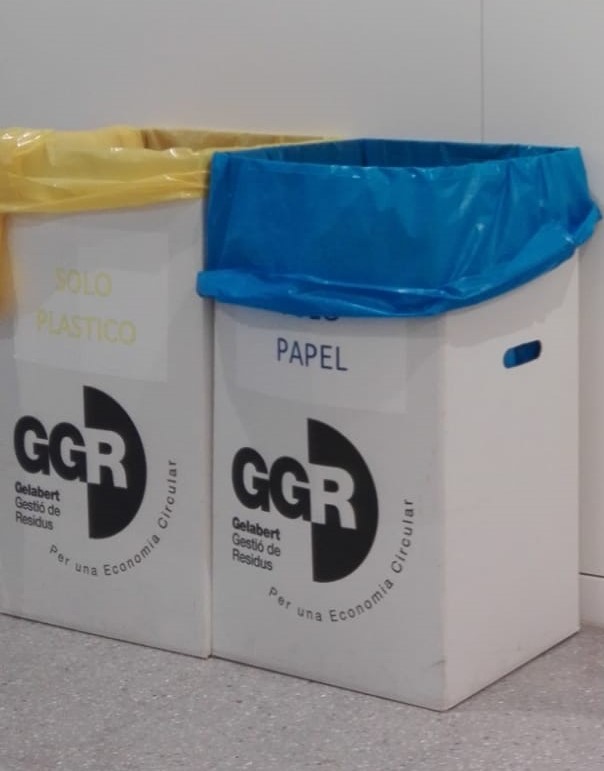

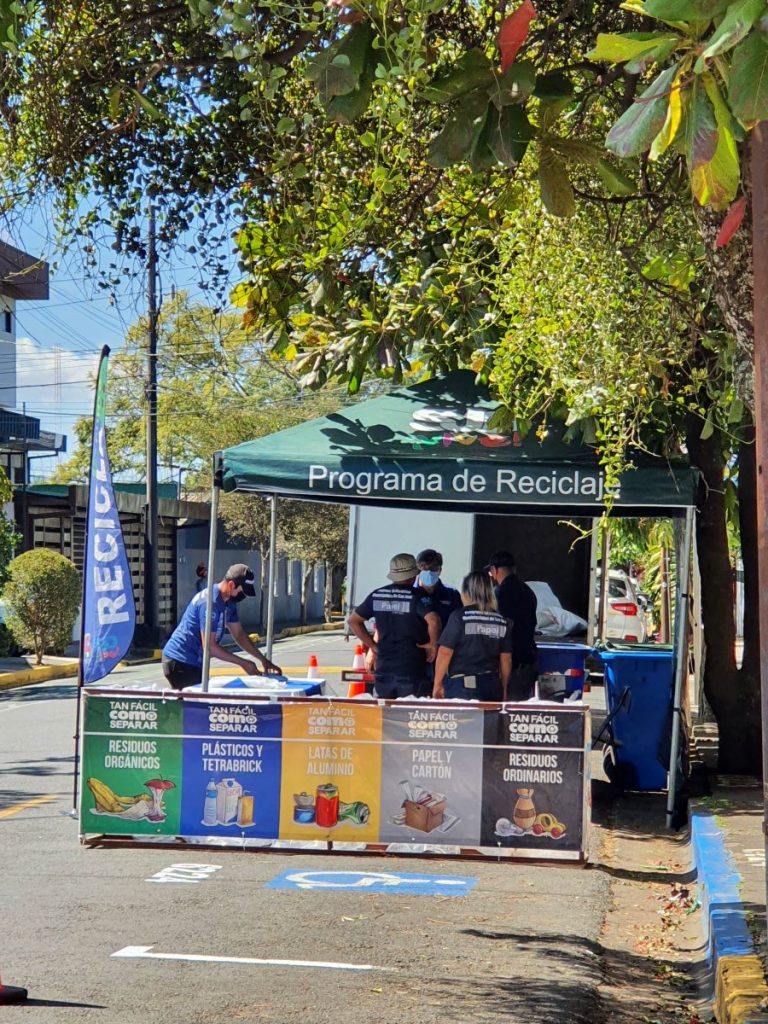

With this article, our aim is to create a ‘recycling for dummies’ mini-guide for Spain (without the negative connotation, it is a necessary citizen improvement step), for people who live in Spain or spend some time there and who sometimes feel lost with so many colours of bins, wondering how to recycle properly.
As I always say, we at Planeta Sana are not perfect either, and we have learned a lot while working on this article!
Recycling: which bin to use in Spain?
In Spain, there are 5 sorting containers:
- Yellow for packaging
- Green for glass
- Blue for clean paper and cardboard
- Brown for compost (not all cities have this container)
- Grey for leftovers
There are also “Puntos Verdes” (the word for word translation would be Green points) where other waste is collected that cannot be put in any of these containers. For example, for battery recycling, clothing recycling, and electronics. When there is no Punto verde, this kind of objects can also be left in “Puntos limpios”, which are either fixed or mobile (allowing more people to access them).
In Barcelona, we currently have 134 green points as we are writing this article.
This is not talked about enough. Not enough is recycled, and recycling is crucial in view of our dependence on raw materials and the impact of their extraction in mines.
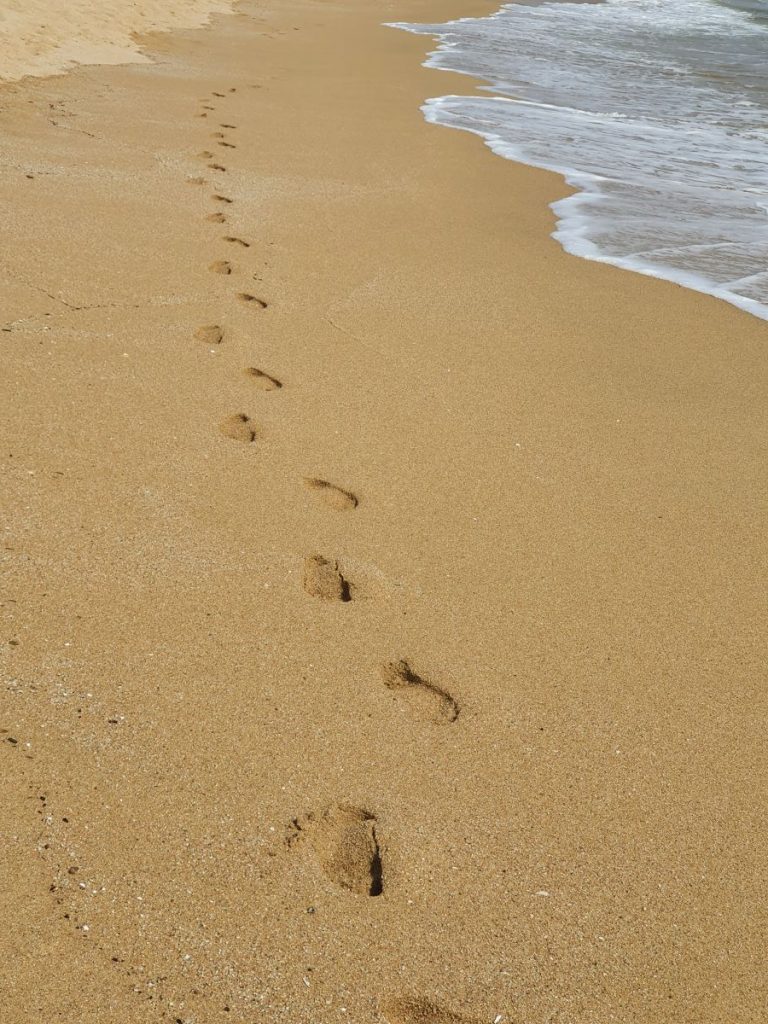

Today’s world is technology-intensive, which is an ecological disaster if we don’t think in terms of eco-design and recycling/reuse. Whether it is the recycling of solar panels, our mobile phones, or the batteries in our electric vehicles. We need to think about recycling the materials needed for renewables, such as wind turbines.
Most of our technologies are poorly designed and do not allow for recycling due to the dispersion of different minerals, some of which are very rare. And rare or not, they have a huge ecological impact… A topic we will certainly talk about in another article!
Recycling process according to the type of waste
Secondly, it is important to note that recycling is different depending on the materials.
Recycling cardboard does not follow the same process as plastic, and recycling plastic does not follow the same process as recycling glass, for example.
Therefore, sorting must be done differently, depending on the material.
For example, a plastic container is accepted even if it is dirty, but this is not the case for cardboard or paper, which must be clean and dry.
Why recycling waste materials is important: some misconceptions about recycling
Some people do not recycle, arguing that recycling means taking work away from the people who work in recycling plants. This is obviously not the case. In fact, the opposite is true. If we stopped recycling tomorrow, the recycling mechanisms would be impossible and might no longer be profitable, so recycling might be abandoned, including the jobs linked to these sectors.
Let’s also think about the safety of workers. If we stop recycling and put dangerous substances anywhere, these are the people who will be directly exposed.
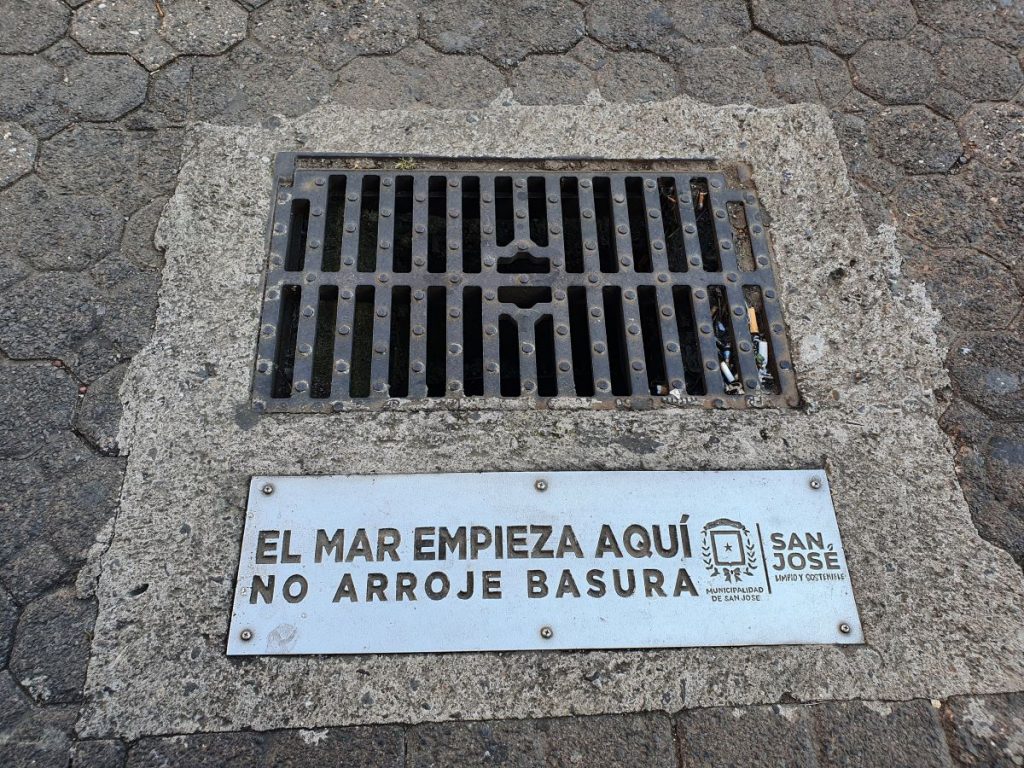

We also believe that we cannot really recycle and that our efforts are useless. But the more we recycle, the more demand we create and the more the recycling supply adapts.
Recycling also has an impact on global warming, on soil, air and water pollution. Because when we do not reuse or recycle our waste, it gets buried or burnt. This creates pollution that can be partly avoided.
Spain recycling bins and colours:
How to recycle glass (green container)
Glass can be recycled quite well.
In Spain, all glass is put in the green bin, regardless of the colour of the glass.
This is not the case in all countries, but Spain has chosen to equip itself with machines that separate glass by colour.
What you need to know
Food scraps should be removed, but it is counterproductive to wash the container or remove the labels, as the recycling process involves high temperatures that make prior washing unnecessary and wasteful.
What to avoid
Do not mix materials.
Contrary to popular belief, there is no one at the recycling plant sorting out the different bits of glass. If the machines detect that a material other than glass is present in the container, the entire container may be rejected by the sorting unit and end up in the landfill! So make sure you don’t put anything else in! Remove any plastic caps, mirrors, window glass, and glass ceramics: all this is not glass even if it looks like it.
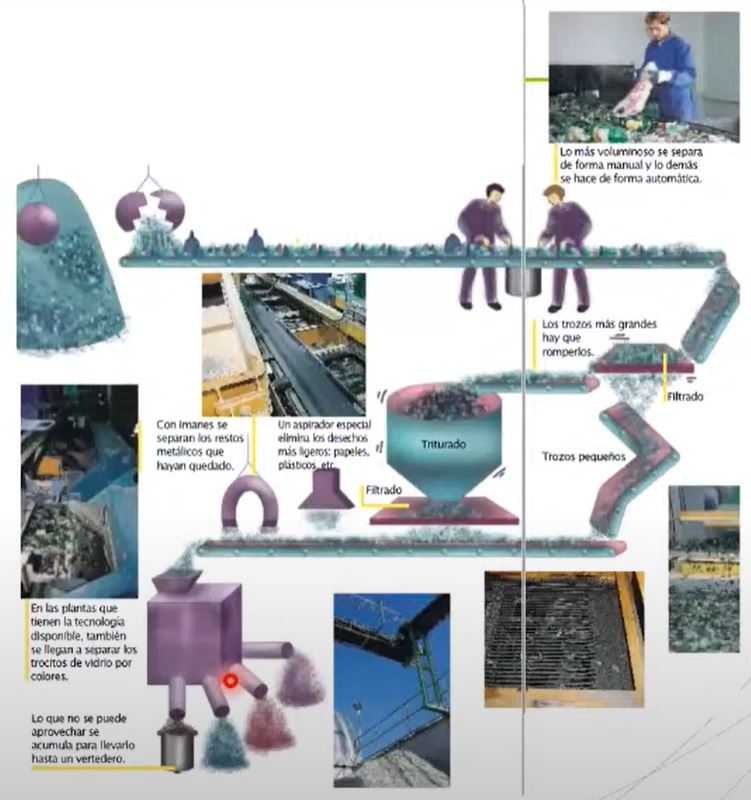

How to recycle paper and cardboard (blue bin)
The first thing to know is that only clean paper can be recycled.
Grease contaminates the machines that process the paper and can damage them. So don’t recycle dirty paper cutlery or greasy pizza boxes, which should go into the grey container.
Good to know: it doesn’t matter if there is a small amount of something else, such as staples or a small plastic window on an envelope, the paper can still be recycled.
But if there is a lot of it, such as a plastic spiral from a document or a large plastic window on a box that contained a toy, then we must separate before placing it in the blue bin.
How to recycle plastics and packaging (yellow bin)
We have already explored plastic recycling and other packagings in an earlier article. We also made a video with an expert on our YouTube channel that discusses some of the questions in that same article and explains why it is important to recycle plastic despite its many limitations.
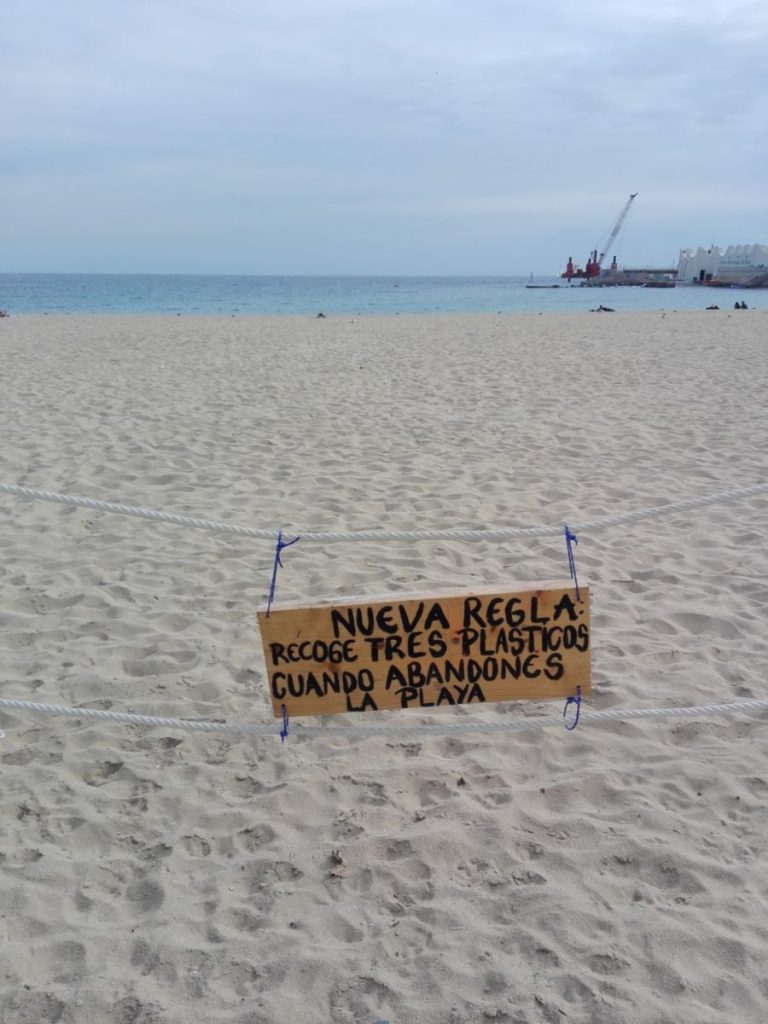

However, it is worth remembering some principles:
- plastic is best recycled when it is large
- recyclable vs recycled: Even if we recycle all of our wastes, not all packaging is 100% recyclable
- Hence the importance of not putting different plastic materials in the same bag: there is a risk that the machine will reject it all.
- The yellow bin is used to recycle all types of packaging, whether plastic, Tetra Brik, aluminium, metal, etc.
- Some examples of what goes in the yellow bin: aluminium foil, plastic wrap, tins, sprays, deodorant cans, plastic bags, yoghurt pots and lids, ceramic containers, wooden fruit and vegetable crates, toothpaste tubes. More information on the Spanish Ecoembes website.
How to recycle compost (brown container)
As mentioned above, this will depend on each municipality.
In Barcelona, you can put a lot of things in this container, but you should know that the more you put, the lower the quality of the compost and the more difficult it is to sell.
So even if Barcelona accepts dirty or wet papers, it is better to place this type of waste in the grey containers.
Ideally, only food or vegetable scraps should be thrown into the brown container.
Non-recyclable waste (grey containers)
Be careful, just because it is called the leftovers container does not mean that you should put everything that does not go in the other containers! Some of it has to go to the green recycling point. Every town has one, just check with your local council.
These green points accept different types of waste, for example they are those who accept electronic recycling.
Catalonia even promotes recycling in the green points by giving discounts to your water bill, which I’ll explain in another article.
Basically, it is safe to say that all our bathroom rubbish goes into the grey bin (tampons, wet towels, nappies, hair) as does any kitchen waste that can’t go into the paper, as mentioned above (greasy pizza boxes, dirty paper plates and towels, used sponges).
Note: if you’re wondering how to say ‘recycling bin’ in Spanish, it’s “contenedor de reciclaje”.
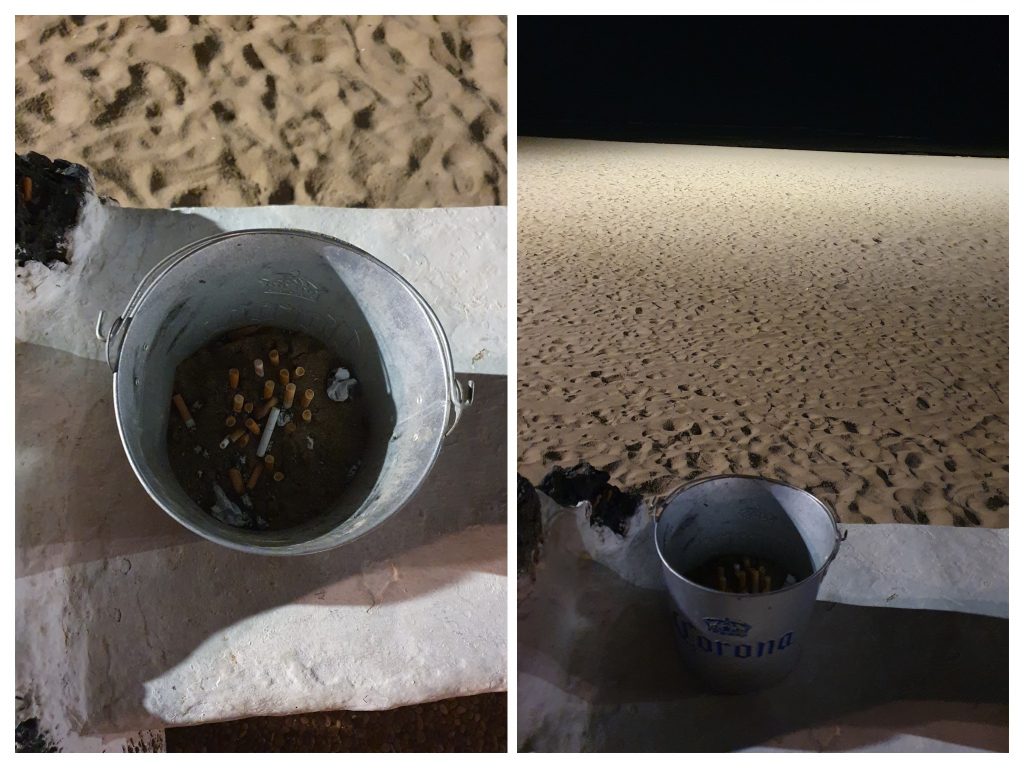

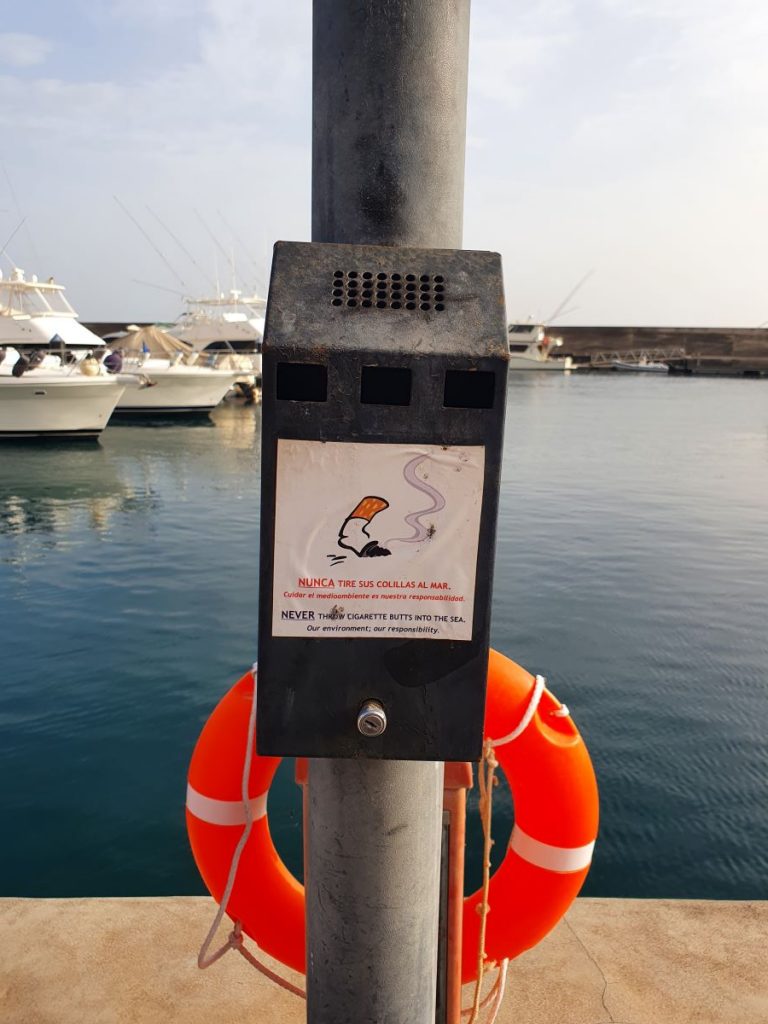

Don’t throw your cigarette butts just anywhere! They go into the grey bin.
Who is in charge of recycling in Spain?
We talked to Marc about this in our interview about plastic recycling in the Metropolitan Area of Barcelona.
Video in Spanish with optional English subtitles on plastic recycling
In the initial stage of the recycling process, it is the city councils, sometimes in the form of local public administrations grouped together like the AMB, that deal with waste management. For example, the AMB manages two facilities for separating packaging and the distribution of flows between the two, and it also ensures that recycling is as efficient as possible.
But as Marc says – and let’s not forget this – the recycling process actually starts at home! With each citizen correctly separating waste into bins. So, when asked “who does the recycling in Spain?”, let’s not forget that it is us, the citizens, who are the main actors in this environmental issue.
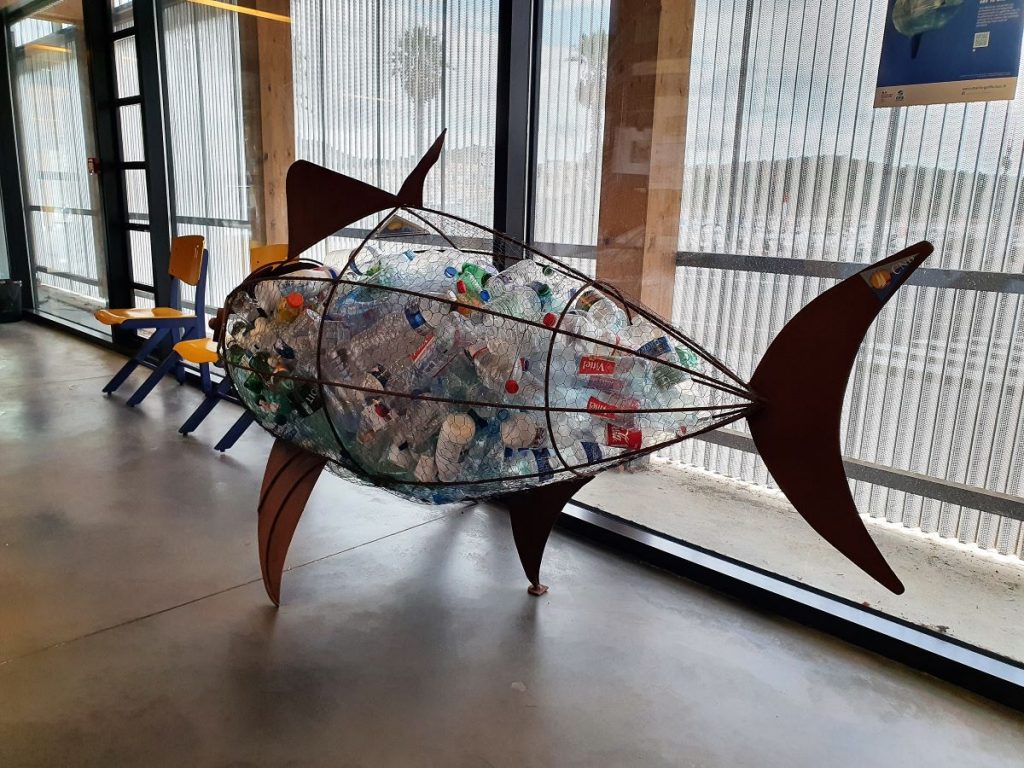

Then, of course, each council organises the collection of the bins and sends them to a sorting centre.
From there, the mechanical sorting process begins. The sorting centres are equipped with machines to detect the different types of waste.
Once these materials are ready, environmental non-profit organisations take over and collect them. The main ones are Ecoembes and Ecovidrio. Ecoembes manages all waste packaging in Spain. Ecovidrio takes care of glass waste.
What is changing with the new Spanish law on waste and soil contamination?
Whether you are for or against recycling, you will really have to get used to this new regulation.
Here are the main points to remember:
- Shops of more than 400 m2 will have to dedicate at least 20% of their surface to the sale of bulk products from 2023.
- The sale of single-use plastics will be prohibited from the day after the decree is issued. This concerns products such as cotton buds, straws, cutlery, plates and plastic glasses.
- Hotels and restaurants will have to offer tap water free of charge in their establishments to help reduce the consumption of plastic water bottles.
- The new law allows municipalities to ban smoking on their beaches if they wish.
- Penalties are increasing, with minor offences incurring fines of up to 2,000 Euros (900 Euros before this law) to serious offences which can receive penalties of up to 1,750,000 Euros.
These measures are urgent, as Spain recycling statistics are bad. It is not meeting the minimum recycling rate imposed by the European Union. Indeed, since 2020, all countries should be recycling at least 50% of their waste, but according to Eurostat data for 2020 Spain recycles only 36% of its waste.
Tips for recycling at home, how to recycle better and make it easier for recycling units?
Zero waste
Buying in bulk and therefore avoiding packaging is the best way to tackle the huge challenge of waste. The less you buy, the less you need to recycle! Remember that before the R for recycle, we have the Rs for Reduce and Reuse!
Don’t trust the claims saying ‘100% recyclable’. In theory, everything is recyclable, but in practice certain machines or processes may not be in place as it may not be profitable enough to do so.
Before you buy, check that the packaging is not made of multiple materials, and if it is, check that you can separate them manually.
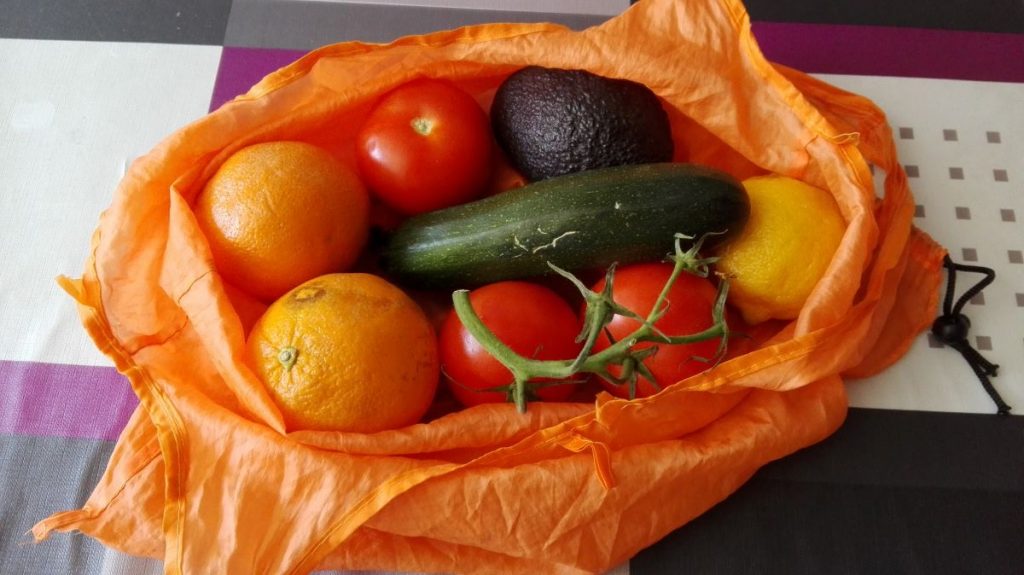

Some tips for better recycling of plastic and aluminium:
- Avoid buying coloured, opaque or black plastics as optical scanners do not detect them and they end up in the landfill.
- Avoid containers with pump mechanisms
- Squash your bottles but make sure the cap is screwed on tightly as otherwise it gets lost in the recycling process.
- For aluminium, make balls the size of tennis balls before throwing it away, to make it easier for machines to detect
- For aluminium coffee capsules, ask the shop that supplies you if they recycle them. If not, rinse them to avoid coffee residues and stack them so that they are better detected by the machines. Note: Some Spanish supermarket chains offer to recycle coffee capsules, and some green points (Puntos Verdes) do too.
- Size matters: it is better to buy products with large packaging that can be recycled better than small ones. Smaller plastic containers are more likely to escape the machines.
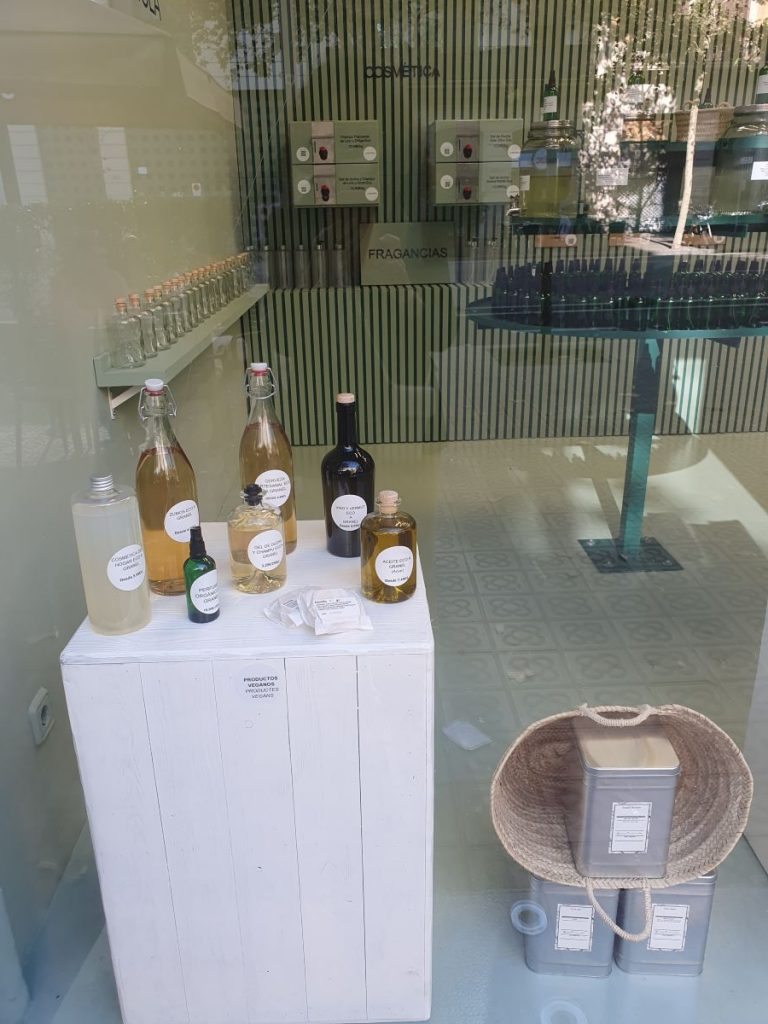

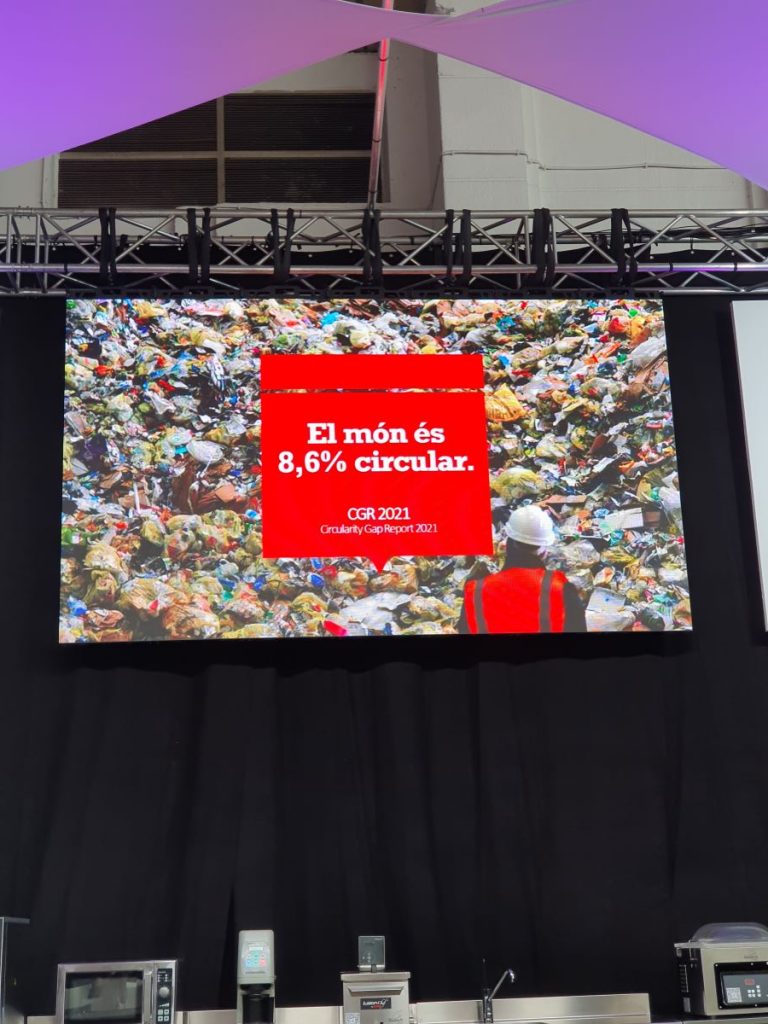

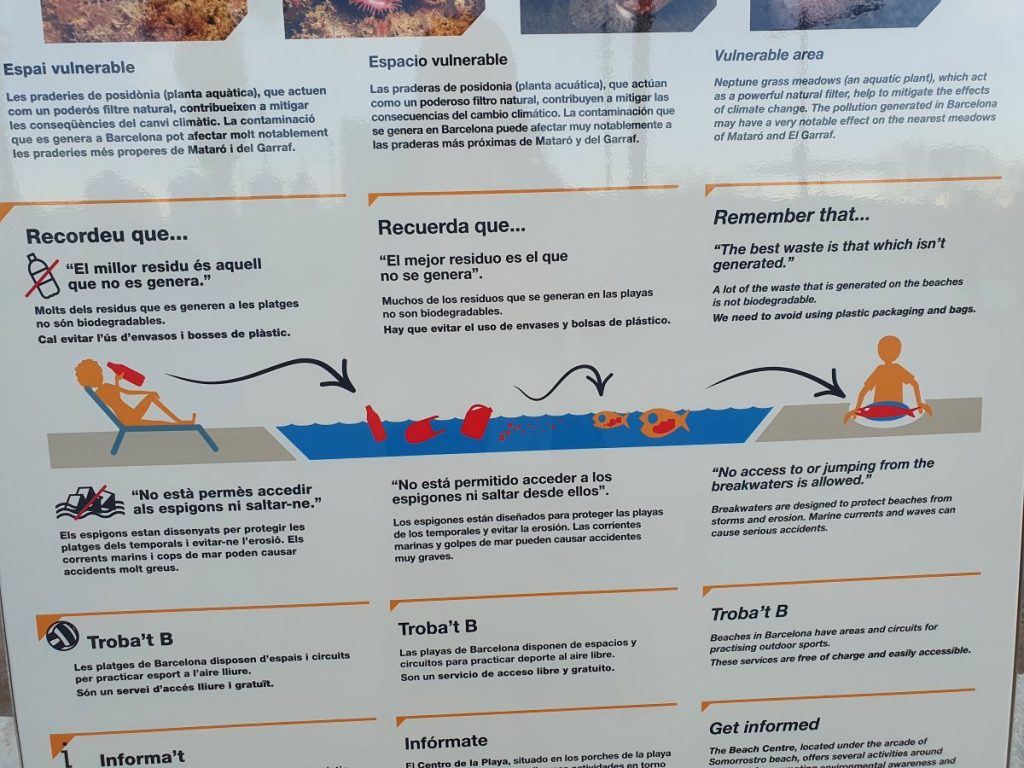

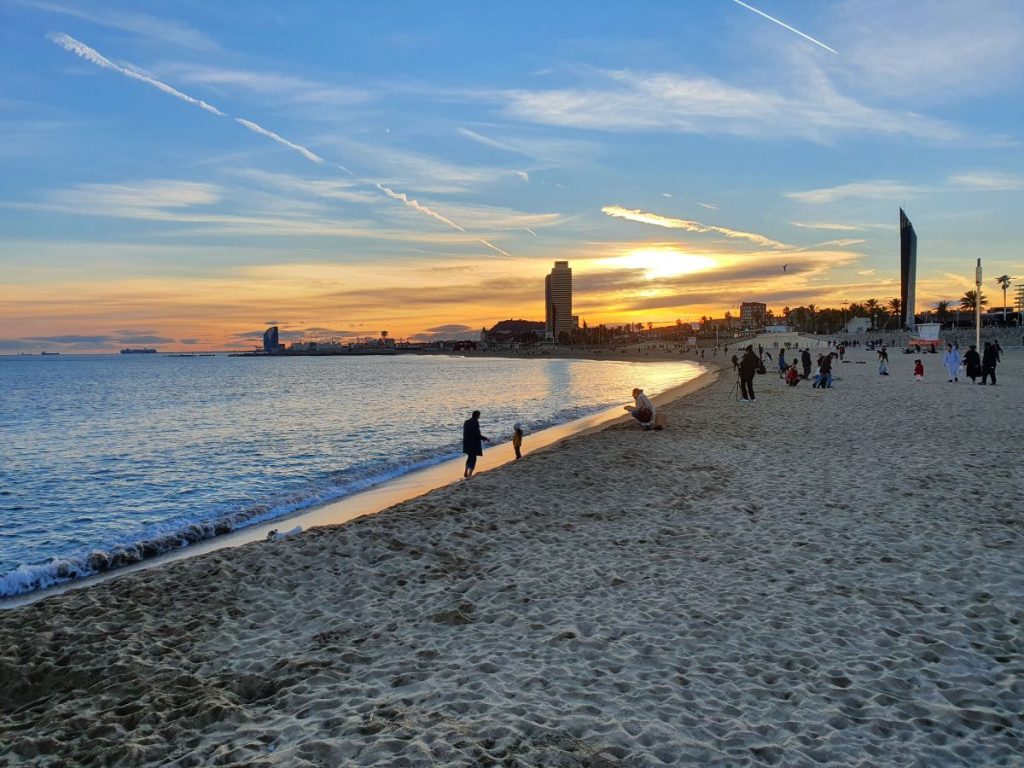

For glass and plastic recycling
- Remove leftovers but do not wash containers to save water
- Separate each of these materials well
What else can you do to recycle your waste?
- Contact brands on social media to ask them to take responsibility for their non-recyclable packaging.
- Change brands when you see that they don’t offer a solution to non-recyclable packaging.
- And last but not least, share this article or any other one that advocates recycling or a zero waste lifestyle: the more people are aware of the problem, the more they can be part of the solution!
If you have any other tips to recycle, please feel free to post them in the comments below. We will try to incorporate them into this page!
And don’t forget that we have created a collaborative address book. If you know of any shops that sell in bulk, sell sustainable fashion or second hand, any repair shops, anything that can avoid waste, please share them on our sustainable address book.
Thank you in advance for your active collaboration. Together we can learn and make a difference to this huge waste problem.

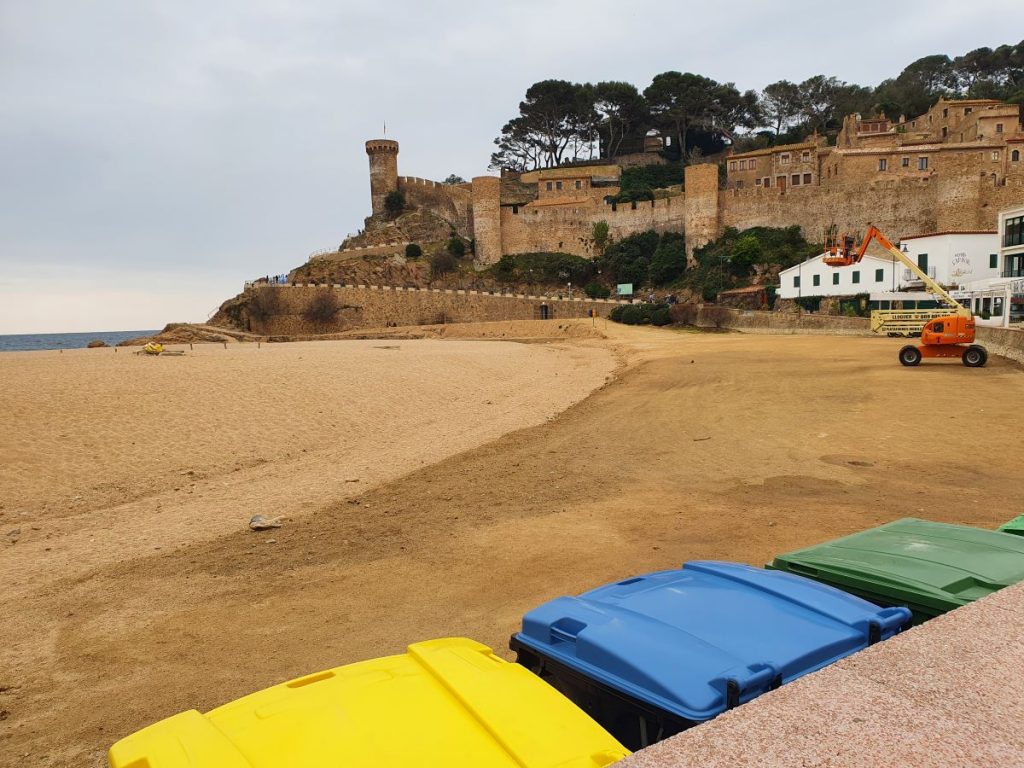
I grew up in Canada where robust recycling programs were established even in the 80s and 90s. I can’t imagine not recycling. I love that you’ve taken an issue that is so important and have broken it down into easy, manageable steps.
Recycling is a big thing here in the UK too! I’ve never been to Spain but this was a really interesting read!
Thanks for your comment. It’s great that the UK has a good recycling system too! It definitely is a very important topic with climate change and I hope my article will be helpful to you if you ever visit Spain!
I love the section about contacting brands and asking them to take responsibility for their non-recyclable packaging! Will definitely do that
Thanks for your feedback and glad that you will do that! Indeed I think in today’s world where companies care so much about their brand image, using too much greenwashing propaganda, it’s good to remind them that the waste is theirs and if it’s in nature it means that their so-called green actions were not good enough and they need to take responsibility for the environmental damage.
I live in Asia where we face serious challenges in waste management. So I hope this article finds its way to many people here, especially the governments. Worth sharing!
Thank you for your message and for sharing. Yes indeed what is happening in Asia is really terrible and it needs to stop. Every country should take responsibility for their own waste and not sending it away to forget everything about it…